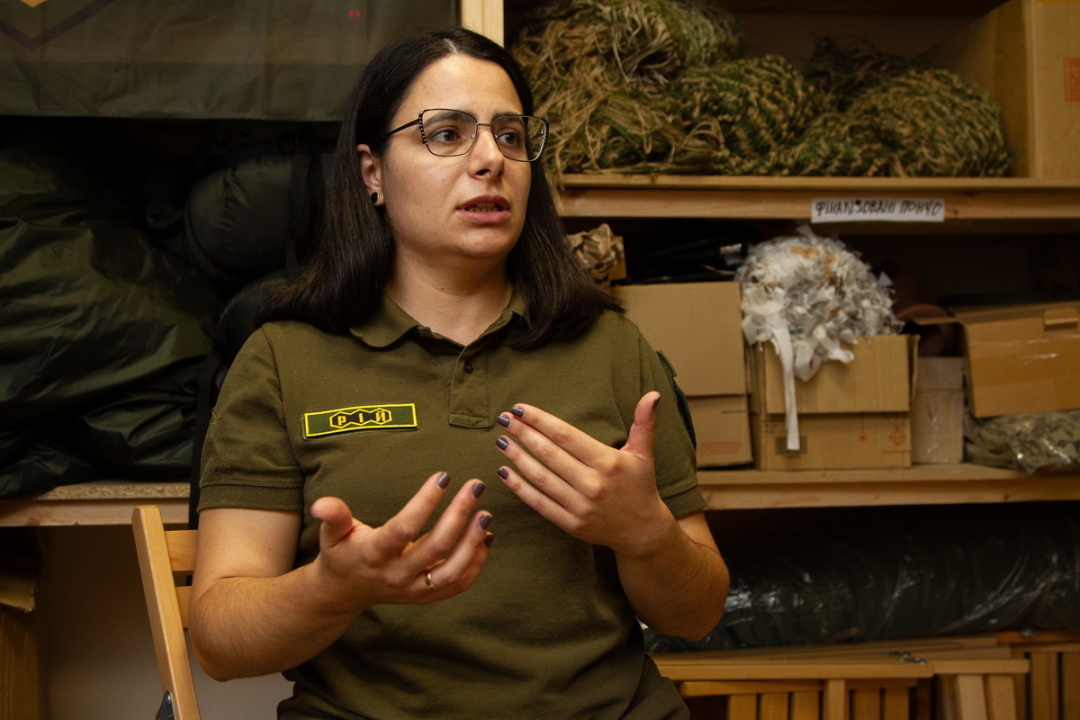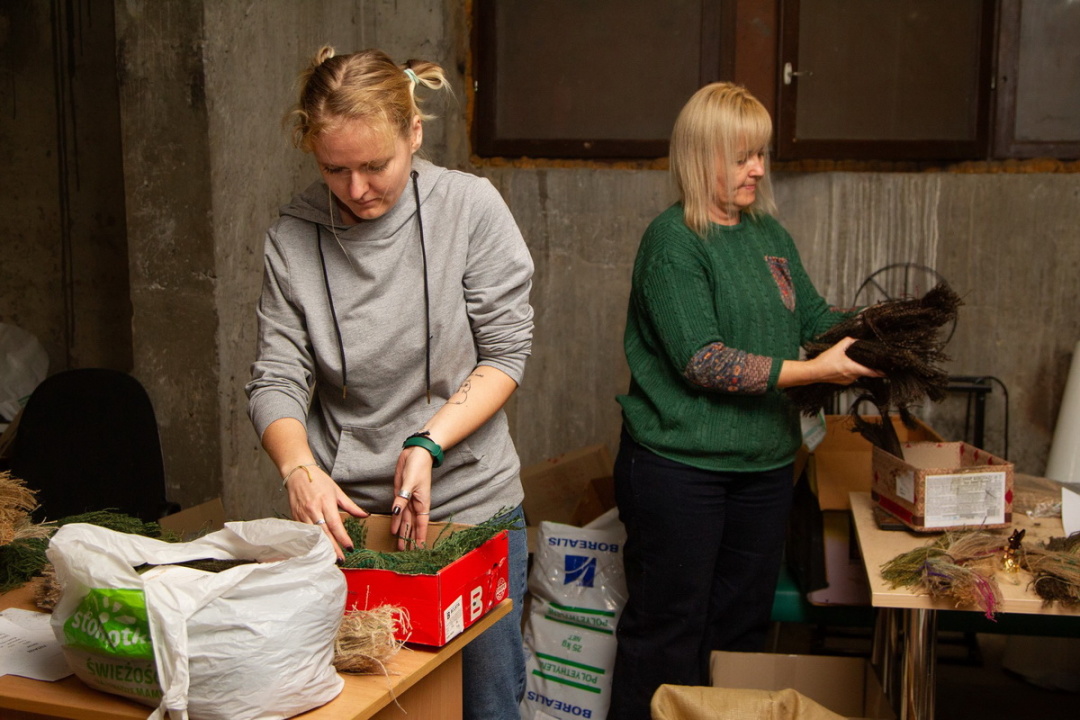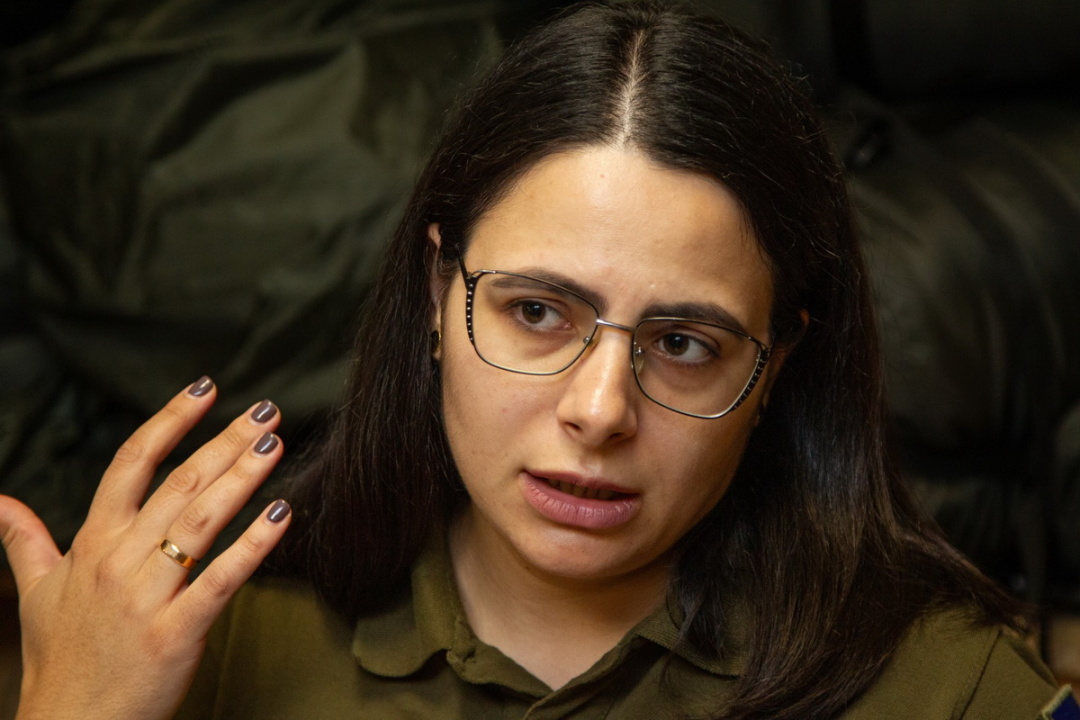While we are waiting for Diana Ilnytska, a volunteer and head of the "Riy" organization, from the Land Forces headquarters (she apologized for being late and asked us to wait at the headquarters), we are given a small tour. This is where the material for camouflage products is packaged and sent to all corners of Ukraine, where craftswomen weave the kits in their homes, sometimes in libraries and schools. And this chocolate for the Armed Forces of Ukraine (I'm shown a shelf of goodies) is put as a bonus in the boxes with the finished products.
Finally, Diana appears, and I ask her what she did in the "land" command. "I received an award for supporting the army, I'll show you, but don't take pictures of me with it," she asks. While the photographers are taking pictures of the medal, I ask her how the guys from "Zero" thank her. "For me, the best gratitude is when they call and say, 'Diana, thank you, thanks to your camouflage kit, the enemy drone 'lost' the guys (i.e. they stayed alive); or, thank you, thanks to your sleeping systems, they slept for the first time in the war.
We sit down with Diana near the same sleeping systems, one of the foundation's projects, and talk about the war, the foundation's products, and our own volunteering.

- Why are you called "Riy"?
- A swarm [Riy] is a collection of bees, some of them wild, that can bite a bear to death (her answer is met with laughter from everyone present).
- Diana, how did Ukrainian volunteering change during the Great War? At the beginning of the war, it seemed that volunteers were supplying the Armed Forces of Ukraine with almost everything: from underwear and medicines to armor and thermal imagers.
In the editorial office, we wondered whether a volunteer should be engaged in such things in the second year of the war (thermal imagers, clothing, equipment). Is it right for volunteers to substitute themselves for the state and the Ministry of Defense in such things for so long? Wouldn't it be more logical for a volunteer to be engaged in, for example, helping with medical treatment and prosthetics? Taking care of the families of the victims?
- No country is ever fully prepared for something like a full-scale invasion. It is normal that volunteerism existed in the mode of providing the frontline with the most basic things - food, carriages, sleeping bags. Now volunteers have learned to analyze the needs and are engaged in the type of assistance that is needed either at the "Zero" or personally for a particular soldier. We have improved the supply in the army, it is now one hundred percent. If we talk about prosthetics, treatment, work with veterans and families of the fallen, this is also a function of the state. But we cannot define it this way: something military is the responsibility of the state, and everything else is the responsibility of volunteers. I see it this way. During the war, there are problems of supply, something is missing, something the state simply cannot supply in quantity or by specific types. And if volunteers provide this necessary product from below, giving it maximum publicity, it is a plus for everyone. For the front line, for the military, and for society. Here, the task of the state is only to hear these voices, analyze what is said and respond to this common struggle.
Today, military volunteering is a profession, a specialization, and sometimes their work is no different from that of military personnel. Volunteers also do analytics, compare prices in the market (we call it "rationalization"). When it comes to production, we never buy batches of products that cost, say, UAH 200,000, we organize a process in which it will cost 50,000 - we rationalize both the costs and the process itself. The precise definition of volunteering is the voluntary spending of time working for a cause. And this work is not paid.
- Are you a volunteer?
- I am not a volunteer. Volunteers don't get paid. The public sector does. We have a charitable foundation. When I founded the foundation, I was a volunteer, and so was our entire team. Then we decided that our foundation would professionally organize work in the field of charity, and we began to raise funds to hire specialists who were ready to work. We still have a credo: charity for change in Ukraine, and the main thing for us is that our actions lead to change. Volunteers are change-makers, they help the state to see what it cannot see. Volunteers, when they analyze, rationalize, and have a connection to the frontline, can see and analyze gaps that have not yet been closed and close them. And there are gaps, this is a big war.

- Let's illustrate this with your projects.
- From the beginning of the invasion, from March to May 2022, the Armed Forces of Ukraine needed basic necessities such as food, clothing, and sleeping bags. Then the state adapted to the situation, and the speed of this adaptation was frantic. The main needs were met quickly. In the summer, we thought about what other problems the army had.
- Let me clarify, you were in this building from the very beginning?
- At first, we worked online, meaning that all the aid that came in was stored in different warehouses, we just organized the logistics. We didn't have a picture of everyone running around the headquarters doing something. We were online (people responded to my posts on social media) and worked without an office for a long time, but this did not prevent us from increasing our volumes, being efficient and working to strengthen the army. We bought and sent sleeping bags, T-shirts, and underpants. We were well aware that a warrior is not a Marvel hero, he is a human being. We decided to be there for people who have basic needs. When the problems with the material supply were solved, we looked at the "winter", at the material supply in winter. There was enough clothing, but we realized that we could strengthen the Armed Forces of Ukraine with a better sleeping system that could be used right outside. So we started researching the issue, and then we realized that only NATO countries have sleeping systems, and they simply do not exist in Ukraine.
- And what exactly is a "sleeping system"?
- We just imagined a lot of situations in which guys from different branches of the military find themselves at war. Sleeping bags were enough for situations when you are in a dugout. But when you go to your positions in winter and you are a sniper, scout, anti-aircraft gunner or a soldier who stands at an observation post for a long time, we realized what is needed there: waterproof, maximally insulated sleeping systems. We were thinking about this category of soldiers who need a break in sub-zero temperatures and prolonged precipitation. We conducted research on such products in NATO countries and in Ukraine. We invited climbers, tourists, technologists, military specialists to discuss the issue... And we realized that we need to create a sleeping system. If the military sleeps in full ammunition, then we need to expand the space in the sleeping bag where the shoulders and legs are. If a soldier does not take off his boots, then the bottom of the sleeping bag needs to be reinforced, with extra strong fabric sewn in. We had to come up with a safe system of "getting out" of the system: a soldier can simply open the sleeping bag with one hand movement. We also needed to provide heat-insulating elements that would prevent "a single drop" of heat from escaping from the sleeping bag. All of this together makes it possible to sleep outside in sub-zero temperatures without freezing or getting frostbite. The system includes a carimat, a waterproof cover, and a sleeping bag. It was a real gift when a fighter called and said he had finally slept for a year and a half... The guys appreciated everything we had worked hard to produce. Each batch raises millions of UAH. Last year we raised three million for about 500 sleeping systems. We sent them to the units for special missions.
After the sleeping bags, we realized that improving the living conditions and taking care of the soldiers means increasing their combat capability. It is possible not only through the supply of weapons, because a soldier who has slept and showered is much better able to fight the enemy. This is confirmed by research in NATO armies.
I have heard it all with my own ears: let us sleep and wash. After all, combat operations are taking place in landings, in fields, in bombed-out villages... And there are so-called mobile laundry and bathing complexes - there are showers and washing machines. We realized that in order to have enough of them, we needed to open our own production. And so we opened it - we make them out of twenty-foot shipping containers. This is a very sturdy construction, it can be placed on a container ship and moved from place to place despite obstacles. Since January, we have made eleven sets for the frontline. The army is only 20% provided with baths, and many more are still needed. People love to support this project.
I DON'T FEEL THAT VOLUNTEERING IS RUNNING OUT OF STEAM
- Do they like to support? I have heard that volunteering in Ukraine is running out of steam.
- On the contrary. It's not running out of steam, it's getting stronger. Do people get tired of donating? This is possible if they do not feel trust or need. Then they may reduce their donations, but if we are talking about those who have found their place to help - a foundation, a volunteer - if a person feels that they want to donate, the flow of donations does not stop. We don't see any problems with this, even though the smallest donation can be UAH 5-10, and the largest from legal entities can be up to half a million UAH.

- And what happened next?
- And then, working with the material supply, we looked at camouflage systems. Analytics showed that, and the sniper school we communicate with confirmed to us that they needed reinforcement in this area. We launched the project and saw that the pace of weaving camouflage lagged behind the need. To provide the snipers with the gear, we have developed a technology that allows us to speed up the process.
We collect sets of materials for weaving. First, we collect coffee bags. Then we dye them in the paint shops, the colors are chosen by our specialists in cooperation with the sniper school. After dyeing, we send the material to the suturing shops, where the bags are disassembled into threads by hand. The threads are transferred to the packaging shop, where they have a weaving technology (it is filmed and accompanying text is written with instructions on how to do it), and a formula (colors and lace density are taken into account), all of which are used by the craftswomen.
We make special mannequins, frames for weaving, and ship everything all over Ukraine. They weave in libraries, clubs, apartments... This is all our "camouflage battalion" - that's what we call it.
Then all the finished kits come back to us, and we check the quality. Our task is not only to give one camouflage gear to a sniper, but to make him a whole set so that he is camouflaged for any task. The material used must be tested to ensure that it does not "glow" through night vision devices.
Now the project is at the stage of launching the process, we are weaving 50 pieces per month, and we plan to reach 250 sets per month. The set includes a helmet, armor, ghillie suit, cloak, jacket, and poncho.
- I also saw you collecting bottle caps to donate them and spend the money on flags for the brigades?
- Collecting bottle caps is a fundraising tool. We have a lot of such tools: street presentations, fundraising, and selling souvenirs. And there are also parallel projects. We have created a space to support the families of the Armed Forces of Ukraine soldiers: we support children, accompany wives during pregnancy and childbirth, and even have breastfeeding specialists. Our doors are open, you can knock on them and come for a tour, hear about the logic of the project and how we build them. And people say: you have such a scale... Scale is a characteristic word for us...
- And how much money do you have to finance the project every month?
- If we were to measure our work in man-hours, it would be a huge amount of money, so we don't prepare figures for publicizing, we just help the army. You asked how volunteering is changing in Ukraine... I was talking about the phenomenon, but I can also talk about myself. I have become a stronger believer in people... In two years, I have become convinced that believing in people is the right thing to do. "You are important for the victory. Our work is changing history," I sincerely repeat this to people. And they are always by my side.
Lana Samokhvalova, Kyiv
Photo by Kyrylo Chubotin

